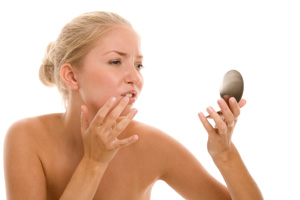Mouth Warts
 Mouth Warts? Don’t Panic!
Mouth Warts? Don’t Panic!
Cause for mouth warts is the Human Papilloma Virus (HPV) which incorporates over 70 varieties of virus that break out in a variety of body parts, most commonly on hands, feet and genitalia. Many types of warts are contagious and the virus has spread widely among sexually active people. Thus, HPV counts as sexually transmitted disease and particularly mouth warts can be unpleasant, often caused by oral sex or exchange of body fluids with an infected person.
|
|
Infected people do not experience any discomfort or pain because warts are simply hardened benign abscess and from a medical point of view nothing to worry about. The only time warts can become dangerous is when they appear in sensitive areas – mouth warts can be worrying if they appear inside the mouth and obstruct respiratory tracts. Again the actual wart is not dangerous; it is rather the fact that in its size it may block an important organ or function. Although the HPV virus is not life threatening, an infected person often gets warts over and over because the virus stays in the body once it has entered.
A large part of warts disappear on their own without needing any treatment. However, they are unpleasant to look at and people often choose some sort of treatment to speed up the healing process- a blemish like that can seriously affect a person’s self-esteem, particularly when the wart is openly visible or makes sex life problematic. External mouth warts are easy to get rid of as there are numerous over-the-counter creams and tinctures that contain salicylic acid or similar agents. This kind of medicine is effective most of the time because they moisten the wart which can then be fined down. However, it is best to seek a dermatologist because the mouth area is very sensitive and some products may be toxic and dangerous if they get into the mouth.
|
|
Choose an agent that is thick, such as a gel or cream rather than a liquid. You may also try a home remedy first, such as milder acids found in citrus fruits, apple cider vinegar, garlic juice, tea tree oil or birch products. These agents are not toxic in any way, and even if you accidentally get some in your mouth you won’t have to suffer unpleasant consequences. These simple options usually work, but sometimes the warts are just stubborn and will not disappear. If this is the case, a dermatologist can help with a procedure in which the wart is removed surgically. This is effective but can be unpleasant because it may leave a scar. There are various types of surgery, one of them involving electric waves which do not leave a scar, but the procedure requires general anaesthesia. There is also the option to freeze or burn the warts away, but this can become problematic in the mouth area.
If warts appear inside your mouth or even in the throat, the only treatment is often laser surgery. The infected cells are killed and in simple terms ‘burned’ which requires local anaesthesia. Laser surgery is also an option for external warts, but less invasive methods may be more appropriate. Bear in mind that most procedures that involve a doctor may be painful or involve anaesthetics, and it should not be your first and only option. To avoid scars and pain, try creams first. Remember that there is a chance of returning warts, and having many scars or going through numerous painful procedures is probably no comfort.
It is difficult to prevent infection with the HPV virus because carriers are often unaware that they have the virus. Especially when getting involved with a new partner or frequently changing sexual partners, it is important to be vigilant. Even condoms cannot guarantee being safe, but the risk of infection is much lower. Mouth warts are often caused by oral sex with a partner that has genital warts or simply carries the HPV virus in their system. If you know that this condition exists, it is best to use a condom and protect yourself to avoid unpleasant warts around your mouth or even in more dangerous parts such as your throat.